Related Research Articles

Counterintelligence (counter-intelligence) or counterespionage (counter-espionage) is any activity aimed at protecting an agency's intelligence program from an opposition's intelligence service. It includes gathering information and conducting activities to prevent espionage, sabotage, assassinations or other intelligence activities conducted by, for, or on behalf of foreign powers, organizations or persons.

The United States Naval Criminal Investigative Service (NCIS) is the primary investigative law enforcement agency of the U.S. Department of the Navy. Its primary function is to investigate major criminal activities involving the Navy and Marine Corps, though its broad mandate includes national security, counterintelligence, counterterrorism, cyberwarfare, and the protection of U.S. naval assets worldwide. NCIS is the successor organization to the former Naval Investigative Service (NIS), which was established by the Office of Naval Intelligence after the Second World War.
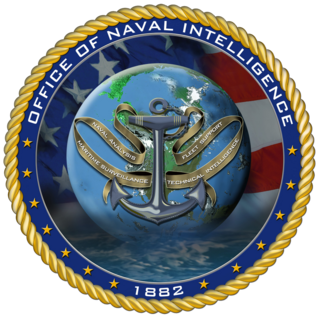
The Office of Naval Intelligence (ONI) is the military intelligence agency of the United States Navy. Established in 1882 primarily to advance the Navy's modernization efforts, it is the oldest member of the U.S. Intelligence Community and serves as the nation's premier source of maritime intelligence.
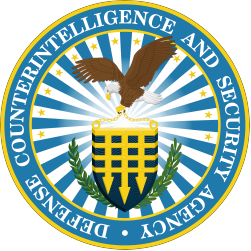
The Defense Counterintelligence and Security Agency (DCSA) is a federal security and defense agency of the United States Department of Defense (DoD) that reports to the Under Secretary of Defense for Intelligence. DCSA is the largest counterintelligence and security agency in the federal government and is responsible for providing personnel vetting, critical technology protection, counterintelligence, training, education and certification. DCSA services over 100 federal entities, oversees 10,000 cleared companies, and conducts approximately 2 million background investigations each year.

James Arthur Williams was a United States Army lieutenant general. Williams served as Director of the Defense Intelligence Agency in the 1980s. He was a 1987 inductee of the Military Intelligence Hall of Fame and was the chairman of the board of directors for the National Military Intelligence Association.
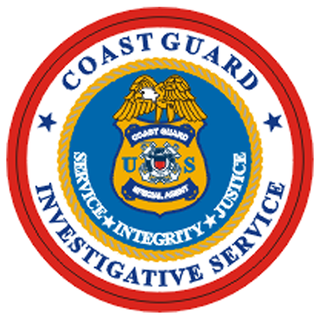
The Coast Guard Investigative Service (CGIS) is a division of the United States Coast Guard that investigates crimes where the U.S. Coast Guard has an interest. It is composed of civilian (GS-1811), active duty, reserve enlisted, and warrant officer special agents.
The Criminal Investigation Task Force (CITF) is an organization created in early 2002 by the United States Department of Defense to conduct investigations of detainees captured in the War on Terrorism. It was envisioned that certain captured individuals would be tried by a military tribunal for war crimes and/or acts of terrorism.

The Marine Corps Intelligence is the intelligence arm of the United States Marine Corps (USMC) and an element of the United States Intelligence Community. The Director of Intelligence supervises the Intelligence Department of HQMC and is responsible for policy, plans, programming, budgets, and staff supervision of Intelligence and supporting activities within the U.S. Marine Corps as well as supervising the Marine Corps Intelligence Activity (MCIA). The Department supports the Commandant of the Marine Corps (CMC) in his role as a member of the Joint Chiefs of Staff (JCS), represents the service in Joint and Intelligence Community matters, and exercises supervision over the MCIA.
The counter-terrorism page primarily deals with special police or military organizations that carry out arrest or direct combat with terrorists. This page deals with the other aspects of counter-terrorism:
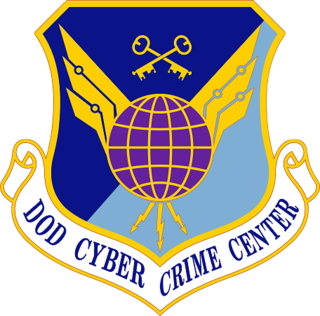
The Department of Defense Cyber Crime Center (DC3) is designated as a Federal Cyber Center by National Security Presidential Directive 54/Homeland Security Presidential Directive 23, as a Department of Defense (DoD) Center Of Excellence for Digital and Multimedia (D/MM) forensics by DoD Directive 5505.13E, and serves as the operational focal point for the Defense Industrial Base (DIB) Cybersecurity program. DC3 operates as a Field Operating Agency (FOA) under the Inspector General of the Department of the Air Force.

The United States Marine Corps Criminal Investigation Division is a federal law enforcement agency that investigates crimes against people and property within the United States Marine Corps.

Mark D. Clookie became the fourth civilian director of the Naval Criminal Investigative Service (NCIS) on February 14, 2010, following his appointment to the position by Ray Mabus, Secretary of the Navy. After his retirement from NCIS in 2013, Clookie worked for an international human rights organization until 2017.

United States Army Counterintelligence (ACI) is the component of United States Army Military Intelligence which conducts counterintelligence activities to detect, identify, assess, counter, exploit and/or neutralize adversarial, foreign intelligence services, international terrorist organizations, and insider threats to the United States Army and U.S. Department of Defense (DoD).
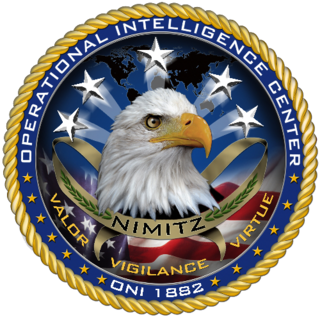
Nimitz Operational Intelligence Center is one of the four "centers of excellence" under the Office of Naval Intelligence (ONI). The center provides and supports decision makers, policy makers and operational commanders with analysis to meet their requirements. Nimitz is headquartered at National Maritime Intelligence Center which is located in Suitland, Maryland, southeast of Washington, D.C.
All-source intelligence is a term used to describe intelligence organizations, intelligence analysts, or intelligence products that are based on all available sources of intelligence collection information.
The United States Department of the Navy Police is the uniformed law enforcement branch of the United States Navy. It provides professional, civilian, federal police officers, to serve and protect U.S. Navy personnel and installations.

Omar R. Lopez is an American special agent and lawyer serving as the sixth civilian director of the Naval Criminal Investigative Service (NCIS) since 2019. He is the first Hispanic American to serve in the role. Lopez was previously the executive assistant director for the NCIS national security directorate.

The director of the Naval Criminal Investigative Service leads the Naval Criminal Investigative Service (NCIS) agency as it investigates and defeats threats from across the foreign intelligence, terrorist, and criminal spectrum by conducting operations and investigations ashore, afloat, and in cyberspace, to protect and preserve the superiority of Navy and Marine Corps warfighters.
References
- 1 2 3 4 5 "Multiple Threat Alert Center (MTAC)". Naval Criminal Investigative Service. Archived from the original on 15 July 2010. Retrieved 24 March 2012.
- ↑ "Terrorism Timeline from 1989 - 1980". Timeline of Terrorism. United States Army. 28 December 2011. Retrieved 23 March 2012.
- ↑ "How to Survive A Terrorist Attack". bhvnederland.nl/. 11 March 2013. Retrieved 30 September 2013.
- ↑ Olive, Ronald J. (2006). Capturing Jonathan Pollard: How One of the Most Notorious Spies in American History Was Brought to Justice. Annapolis, MD: Naval Institute Press. ISBN 1-59114-652-6. LCCN 2006-015639. OCLC 68799835 . Retrieved 2009-11-02.